(Jeff Drouin is in the English Ph.D. Program at The Graduate Center of the City University of New York)
About three weeks ago I had lunch with Ben, Eddie, Dan, and Jesse to talk about starting a community with one of my projects, the Ecclesiastical Proust Archive. I heard of the Institute for the Future of the Book some time ago in a seminar meeting (I think) and began reading the blog regularly last Summer, when I noticed the archive was mentioned in a comment on Sarah Northmore’s post regarding Hurricane Katrina and print publishing infrastructure. The Institute is on the forefront of textual theory and criticism (among many other things), and if:book is a great model for the kind of discourse I want to happen at the Proust archive. When I finally started thinking about how to make my project collaborative I decided to contact the Institute, since we’re all in Brooklyn, to see if we could meet. I had an absolute blast and left their place swimming in ideas!
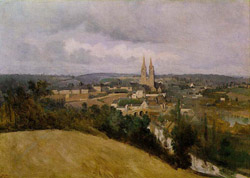 While my main interest was in starting a community, I had other ideas — about making the archive more editable by readers — that I thought would form a separate discussion. But once we started talking I was surprised by how intimately the two were bound together.
While my main interest was in starting a community, I had other ideas — about making the archive more editable by readers — that I thought would form a separate discussion. But once we started talking I was surprised by how intimately the two were bound together.
For those who might not know, The Ecclesiastical Proust Archive is an online tool for the analysis and discussion of à la recherche du temps perdu (In Search of Lost Time). It’s a searchable database pairing all 336 church-related passages in the (translated) novel with images depicting the original churches or related scenes. The search results also provide paratextual information about the pagination (it’s tied to a specific print edition), the story context (since the passages are violently decontextualized), and a set of associations (concepts, themes, important details, like tags in a blog) for each passage. My purpose in making it was to perform a meditation on the church motif in the Recherche as well as a study on the nature of narrative.
I think the archive could be a fertile space for collaborative discourse on Proust, narratology, technology, the future of the humanities, and other topics related to its mission. A brief example of that kind of discussion can be seen in this forum exchange on the classification of associations. Also, the church motif — which some might think too narrow — actually forms the central metaphor for the construction of the Recherche itself and has an almost universal valence within it. (More on that topic in this recent post on the archive blog).
Following the if:book model, the archive could also be a spawning pool for other scholars’ projects, where they can present and hone ideas in a concentrated, collaborative environment. Sort of like what the Institute did with Mitchell Stephens’ Without Gods and Holy of Holies, a move away from the ‘lone scholar in the archive’ model that still persists in academic humanities today.
One of the recurring points in our conversation at the Institute was that the Ecclesiastical Proust Archive, as currently constructed around the church motif, is “my reading” of Proust. It might be difficult to get others on board if their readings — on gender, phenomenology, synaesthesia, or whatever else — would have little impact on the archive itself (as opposed to the discussion spaces). This complex topic and its practical ramifications were treated more fully in this recent post on the archive blog.
I’m really struck by the notion of a “reading” as not just a private experience or a public writing about a text, but also the building of a dynamic thing. This is certainly an advantage offered by social software and networked media, and I think the humanities should be exploring this kind of research practice in earnest. Most digital archives in my field provide material but go no further. That’s a good thing, of course, because many of them are immensely useful and important, such as the Kolb-Proust Archive for Research at the University of Illinois, Urbana-Champaign. Some archives — such as the NINES project — also allow readers to upload and tag content (subject to peer review). The Ecclesiastical Proust Archive differs from these in that it applies the archival model to perform criticism on a particular literary text, to document a single category of lexia for the experience and articulation of textuality.
 If the Ecclesiastical Proust Archive widens to enable readers to add passages according to their own readings (let’s pretend for the moment that copyright infringement doesn’t exist), to tag passages, add images, add video or music, and so on, it would eventually become a sprawling, unwieldy, and probably unbalanced mess. That is the very nature of an Archive. Fine. But then the original purpose of the project — doing focused literary criticism and a study of narrative — might be lost.
If the Ecclesiastical Proust Archive widens to enable readers to add passages according to their own readings (let’s pretend for the moment that copyright infringement doesn’t exist), to tag passages, add images, add video or music, and so on, it would eventually become a sprawling, unwieldy, and probably unbalanced mess. That is the very nature of an Archive. Fine. But then the original purpose of the project — doing focused literary criticism and a study of narrative — might be lost.
If the archive continues to be built along the church motif, there might be enough work to interest collaborators. The enhancements I currently envision include a French version of the search engine, the translation of some of the site into French, rewriting the search engine in PHP/MySQL, creating a folksonomic functionality for passages and images, and creating commentary space within the search results (and making that searchable). That’s some heavy work, and a grant would probably go a long way toward attracting collaborators.
So my sense is that the Proust archive could become one of two things, or two separate things. It could continue along its current ecclesiastical path as a focused and led project with more-or-less particular roles, which might be sufficient to allow collaborators a sense of ownership. Or it could become more encyclopedic (dare I say catholic?) like a wiki. Either way, the organizational and logistical practices would need to be carefully planned. Both ways offer different levels of open-endedness. And both ways dovetail with the very interesting discussion that has been happening around Ben’s recent post on the million penguins collaborative wiki-novel.
Right now I’m trying to get feedback on the archive in order to develop the best plan possible. I’ll be demonstrating it and raising similar questions at the Society for Textual Scholarship conference at NYU in mid-March. So please feel free to mention the archive to anyone who might be interested and encourage them to contact me at jdrouin@gc.cuny.edu. And please feel free to offer thoughts, comments, questions, criticism, etc. The discussion forum and blog are there to document the archive’s development as well.
Thanks for reading this very long post. It’s difficult to do anything small-scale with Proust!
Category Archives: university
post-doc fellowships available for work with the institute
The Institute for the Future of the Book is based at the Annenberg Center for Communication at USC. Jonathan Aronson, the executive director of the center, has just sent out a call for eight post-docs and one visiting scholar for next year. if you know of anyone who would like to apply, particularly people who would like to work with us at the institute, please pass this on. the institute’s activities at the center are described as follows:
Shifting Forms of Intellectual Discourse in a Networked Culture
For the past several hundred years intellectual discourse has been shaped by the rhythms and hierarchies inherent in the nature of print. As discourse shifts from page to screen, and more significantly to a networked environment, the old definitions and relations are undergoing unimagined changes. The shift in our world view from individual to network holds the promise of a radical reconfiguration in culture. Notions of authority are being challenged. The roles of author and reader are morphing and blurring. Publishing, methods of distribution, peer review and copyright — every crucial aspect of the way we move ideas around — is up for grabs. The new digital technologies afford vastly different outcomes ranging from oppressive to liberating. How we make this shift has critical long term implications for human society.
Research interests include: how reading and writing change in a networked culture; the changing role of copyright and fair use, the form and economics of open-source content, the shifting relationship of medium to message (or form to content).
if you have any questions, please feel free to email bob stein
iTunes U: more read/write than you’d think
In Ben’s recent post, he noted that Larry Lessig worries about the trend toward a read-only internet, the harbinger of which is iTunes. Apple’s latest (academic) venture is iTunes U, a project begun at Duke and piloted by seven universities — Stanford, it appears, has been most active. 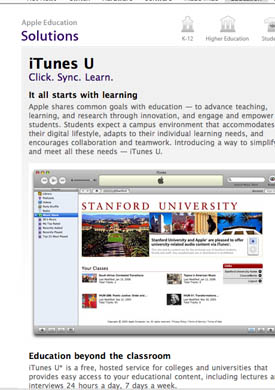 Since they are looking for a large scale roll out of iTunes U for 2006-07, and since we have many podcasting faculty here at USC, a group of us met with Apple reps yesterday.
Since they are looking for a large scale roll out of iTunes U for 2006-07, and since we have many podcasting faculty here at USC, a group of us met with Apple reps yesterday.
Initially I was very skeptical about Apple’s further insinuation into the academy and yet, what iTunes U offers is a repository for instructors to store podcasts, with several components similar to courseware such as Blackboard. Apple stores the content on its servers but the university retains ownership. The service is fairly customizable–you can store audio, video with audio, slides with audio (aka enhanced podcasts) and text (but only in pdf). Then you populate the class via university course rosters, which are password protected.
There are also open access levels on which the university (or, say, the alumni association) can add podcasts of vodcasts of events. And it is free. At least for now — the rep got a little cagey when asked about how long this would be the case.
The point is to allow students to capture lectures and such on their iPods (or MP3 players) for the purposes of study and review. The rationale is that students are already extremely familiar with the technology so there is less of a learning curve (well, at least privileged students such as those at my institution are familiar).
What seems particularly interesting is that students can then either speed up the talk of the lecture without changing pitch (and lord knows there are some whose speaking I would love to accelerate) or, say, in the case of an ESL student, slow it down for better comprehension. Finally, there is space for students to upload their own work — podcasting has been assigned to some of our students already.
Part of me is concerned at further academic incorporation, but a lot more parts of me are thinking this is not only a chance to help less tech savvy profs employ the technology (the ease of collecting and distributing assets is germane here) while also really pushing the envelope in terms of copyright, educational use, fair use, etc. Apple wants to only use materials that are in the public domain or creative commons initially, but undoubtedly some of the more muddy digital use issues will arise and it would be nice to have academics involved in the process.
the future of academic publishing, peer review, and tenure requirements
There’s a brilliant guest post today on the Valve by Kathleen Fitzpatrick, english and media studies professor/blogger, presenting “a sketch of the electronic publishing scheme of the future.” Fitzpatrick, who recently launched ElectraPress, “a collaborative, open-access scholarly project intended to facilitate the reimagining of academic discourse in digital environments,” argues convincingly why the embrace of digital forms and web-based methods of discourse is necessary to save scholarly publishing and bring the academy into the contemporary world.
In part, this would involve re-assessing our fetishization of the scholarly monograph as “the gold standard for scholarly production” and the principal ticket of entry for tenure. There is also the matter of re-thinking how scholarly texts are assessed and discussed, both prior to and following publication. Blogs, wikis and other emerging social software point to a potential future where scholarship evolves in a matrix of vigorous collaboration — where peer review is not just a gate-keeping mechanism, but a transparent, unfolding process toward excellence.
There is also the question of academic culture, print snobbism and other entrenched attitudes. The post ends with an impassioned plea to the older generations of scholars, who, since tenured, can advocate change without the risk of being dashed on the rocks, as many younger professors fear.
…until the biases held by many senior faculty about the relative value of electronic and print publication are changed–but moreover, until our institutions come to understand peer-review as part of an ongoing conversation among scholars rather than a convenient means of determining “value” without all that inconvenient reading and discussion–the processes of evaluation for tenure and promotion are doomed to become a monster that eats its young, trapped in an early twentieth century model of scholarly production that simply no longer works.
I’ll stop my summary there since this is something that absolutely merits a careful read. Take a look and join in the discussion.
ElectraPress
Kathleen Fitzpatrick has put forth a very exciting proposal calling for the formation of an electronic academic press. Recognizing the crisis in academic publishing, particularly with the humanities, Fitzpatrick argues that:
The choice that we in the humanities are left with is to remain tethered to a dying system or to move forward into a mode of publishing and distribution that will remain economically and intellectually supportable into the future.
i’ve got my fingers crossed that Kathleen and her future colleagues have the courage to go way beyond PDF and print-on-demand; the more Electrapress embraces new forms of born-digital documents especially in an open-access pubishing environment, the more interesting the new enterprise will be.
thinking about google books: tonight at 7 on radio open source
While visiting the Experimental Television Center in upstate New York this past weekend, Lisa found a wonderful relic in a used book shop in Owego, NY — a small, leatherbound volume from 1962 entitled “Computers,” which IBM used to give out as a complimentary item. An introductory note on the opening page reads:
The machines do not think — but they are one of the greatest aids to the men who do think ever invented! Calculations which would take men thousands of hours — sometimes thousands of years — to perform can be handled in moments, freeing scientists, technicians, engineers, businessmen, and strategists to think about using the results.
This echoes Vannevar Bush’s seminal 1945 essay on computing and networked knowledge, “As We May Think”, which more or less prefigured the internet, web search, and now, the migration of print libraries to the world wide web. Google Book Search opens up fantastic possibilities for research and accessibility, enabling readers to find in seconds what before might have taken them hours, days or weeks. Yet it also promises to transform the very way we conceive of books and libraries, shaking the foundations of major institutions. Will making books searchable online give us more time to think about the results of our research, or will it change the entire way we think? By putting whole books online do we begin the steady process of disintegrating the idea of the book as a bounded whole and not just a sequence of text in a massive database?
The debate thus far has focused too much on the legal ramifications — helped in part by a couple of high-profile lawsuits from authors and publishers — failing to take into consideration the larger cognitive, cultural and institutional questions. Those questions will hopefully be given ample air time tonight on Radio Open Source.
Tune in at 7pm ET on local public radio or stream live over the web. The show will also be available later in the week as a podcast.
sober thoughts on google: privatization and privacy
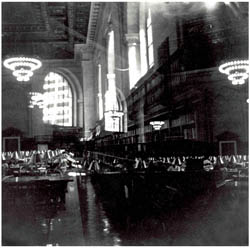
Siva Vaidhyanathan has written an excellent essay for the Chronicle of Higher Education on the “risky gamble” of Google’s book-scanning project — some of the most measured, carefully considered comments I’ve yet seen on the issue. His concerns are not so much for the authors and publishers that have filed suit (on the contrary, he believes they are likely to benefit from Google’s service), but for the general public and the future of libraries. Outsourcing to a private company the vital task of digitizing collections may prove to have been a grave mistake on the part of Google’s partner libraries. Siva:
The long-term risk of privatization is simple: Companies change and fail. Libraries and universities last…..Libraries should not be relinquishing their core duties to private corporations for the sake of expediency. Whichever side wins in court, we as a culture have lost sight of the ways that human beings, archives, indexes, and institutions interact to generate, preserve, revise, and distribute knowledge. We have become obsessed with seeing everything in the universe as “information” to be linked and ranked. We have focused on quantity and convenience at the expense of the richness and serendipity of the full library experience. We are making a tremendous mistake.
This essay contains in abundance what has largely been missing from the Google books debate: intellectual courage. Vaidhyanathan, an intellectual property scholar and “avowed open-source, open-access advocate,” easily could have gone the predictable route of scolding the copyright conservatives and spreading the Google gospel. But he manages to see the big picture beyond the intellectual property concerns. This is not just about economics, it’s about knowledge and the public interest.
What irks me about the usual debate is that it forces you into a position of either resisting Google or being its apologist. But this fails to get at the real bind we all are in: the fact that Google provides invaluable services and yet is amassing too much power; that a private company is creating a monopoly on public information services. Sooner or later, there is bound to be a conflict of interest. That is where we, the Google-addicted public, are caught. It’s more complicated than hip versus square, or good versus evil.
Here’s another good piece on Google. On Monday, The New York Times ran an editorial by Adam Cohen that nicely lays out the privacy concerns:
Google says it needs the data it keeps to improve its technology, but it is doubtful it needs so much personally identifiable information. Of course, this sort of data is enormously valuable for marketing. The whole idea of “Don’t be evil,” though, is resisting lucrative business opportunities when they are wrong. Google should develop an overarching privacy theory that is as bold as its mission to make the world’s information accessible – one that can become a model for the online world. Google is not necessarily worse than other Internet companies when it comes to privacy. But it should be doing better.
Two graduate students in Stanford in the mid-90s recognized that search engines would the most important tools for dealing with the incredible flood of information that was then beginning to swell, so they started indexing web pages and working on algorithms. But as the company has grown, Google’s admirable-sounding mission statement — “to organize the world’s information and make it universally accessible and useful” — has become its manifest destiny, and “information” can now encompass the most private of territories.
At one point it simply meant search results — the answers to our questions. But now it’s the questions as well. Google is keeping a meticulous record of our clickstreams, piecing together an enormous database of queries, refining its search algorithms and, some say, even building a massive artificial brain (more on that later). What else might they do with all this personal information? To date, all of Google’s services are free, but there may be a hidden cost.
“Don’t be evil” may be the company motto, but with its IPO earlier this year, Google adopted a new ideology: they are now a public corporation. If web advertising (their sole source of revenue) levels off, then investors currently high on $400+ shares will start clamoring for Google to maintain profits. “Don’t be evil to us!” they will cry. And what will Google do then?
images: New York Public Library reading room by Kalloosh via Flickr; archive of the original Google page
blogging and the true spirit of peer review
Slate goes to college this week with a series of articles on higher education in America, among them a good piece by Robert S. Boynton that makes the case for academic blogging:
“…academic blogging represents the fruition, not a betrayal, of the university’s ideals. One might argue that blogging is in fact the very embodiment of what the political philosopher Michael Oakshott once called “The Conversation of Mankind”–an endless, thoroughly democratic dialogue about the best ideas and artifacts of our culture.
…might blogging be subversive precisely because it makes real the very vision of intellectual life that the university has never managed to achieve?”
The idea of blogging as a kind of service or outreach is just beginning (maybe) to gain traction. But what about blogging as scholarship? Most professor-bloggers I’ve spoken with consider blogging an invaluable tool for working through ideas, for facilitating exchange within and across disciplines. Some go so far as to say that it’s redefined their lives as academics. But don’t count on tenure committees to feel the same. Blogging is vaporous, they’ll inevitably point out. Not edited, mixing the personal and the professional. How can you maintain standards and the appropriate barriers to entry? Traditionally, peer review has served this gatekeeping function, but can there be a peer review system for blogs? And if so, would we want one?
Boynton has a few ideas about how something like this could work (we’re also wrestling with these questions on our back porch blog, Sidebar, with the eventual aim of making some sort of formal proposal). Whatever the technicalities, the approach should be to establish a middle path, something like peer review, but not a literal transposition. Some way to gauge and recognize the intellectual rigor of academic blogs without compromising their refreshing immediacy and individuality — without crashing the party as it were.
There’s already a sort of peer review going on among blog carnivals, the periodicals of the blogosphere. Carnivals are rotating showcases of exemplary blog writing in specific disciplines — history, philosophy, science, education, and many, many more, some quite eccentric. Like blogs, carnivals suffer from an unfortunate coinage. But even with a snootier name — blog symposiums maybe — you would never in a million years confuse them with an official-looking peer review journal. Yet the carnivals practice peer review in its most essential form: the gathering of one’s fellows (in this case academics and non-scholar enthusiasts alike) to collectively evaluate (ok, perhaps “savor” is more appropriate) a range of intellectual labors in a given area. Boynton:
In the end, peer review is just that: review by one’s peers. Any particular system should be judged by its efficiency and efficacy, and not by the perceived prestige of the publication in which the work appears.
If anything, blog-influenced practices like these might reclaim for intellectuals the true spirit of peer review, which, as Harvard University Press editor Lindsay Waters has argued, has been all but outsourced to prestigious university presses and journals. Experimenting with open-source methods of judgment–whether of straight scholarship or academic blogs–might actually revitalize academic writing.
It’s unfortunate that the accepted avenues of academic publishing — peer-reviewed journals and monographs — purchase prestige and job security usually at the expense of readership. It suggests an institutional bias in the academy against public intellectualism and in favor of kind of monastic seclusion (no doubt part of the legacy of this last great medieval institution). Nowhere is this more apparent than in the language of academic writing: opaque, convoluted, studded with jargon, its remoteness from ordinary human speech the surest sign of the author’s membership in the academic elite.
This crisis of clarity is paired with a crisis of opportunity, as severe financial pressures on university presses are reducing the number of options for professors to get published in the approved ways. What’s needed is an alternative outlet alongside traditional scholarly publishing, something between a casual, off-the-cuff web diary and a polished academic journal. Carnivals probably aren’t the solution, but something descended from them might well be.
It will be to the benefit of society if blogging can be claimed, sharpened and leveraged as a recognized scholarly practice, a way to merge the academy with the traffic of the real world. The university shouldn’t keep its talents locked up within a faltering publishing system that narrows rather than expands their scope. That’s not to say professors shouldn’t keep writing papers, books and monographs, shouldn’t continue to deepen the well of knowledge. On the contrary, blogging should be viewed only as a complement to research and teaching, not a replacement. But as such, it has the potential to breathe new life into the scholarly enterprise as a whole, just as Boynton describes.
Things move quickly — too quickly — in the media-saturated society. To remain vital, the academy needs to stick its neck out into the current, with the confidence that it won’t be swept away. What’s theory, after all, without practice? It’s always been publish or perish inside the academy, but these days on the outside, it’s more about self-publish. A small but growing group of academics have grasped this and are now in the process of inventing the future of their profession.
blog meeting in la-la land
The Chronicle of Higher Education has published a positive piece on blogging in academia, a first person account by Rebecca Goetz, one of the first academic bloggers, of how blogging can actually enhance scholarly life, foster trans-disciplinary communication, and connect the academy to the public sphere.
The timing of Goetz’s article is auspicious, as the institute is currently grappling with these very issues, gearing up for a grant proposal to do something big. Last week, about to dash out the door for the airport, I mentioned this project we’re cooking up to encourage, promote and organize academic blogging with the aim of raising its status as a scholarly activity. Well, last Friday in Los Angeles we assembled a cadre of over a dozen blog-oriented professors, grad students, and journalism profs, along with a radical blogger-librarian, a grassroots media producer, and a sociologist, for a day of stimulating discussion about what can happen when you put blogs in the hands of people who really know something about something.
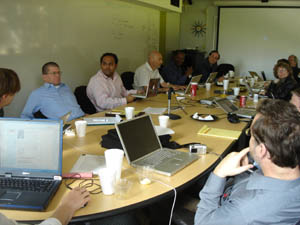
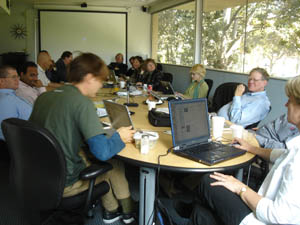
We’re still sifting through notes and thoughts from the meeting, and for anyone who’s interested we’ve devoted an entire blog to continuing the discussion. I guess you could say we’ve formed a little community dedicated to answering the big questions — chiefly, how the blogging medium might serve as a bridge between the world of scholarly knowledge and the world at large — and to helping us form the proposal for a project — a website? a network? a new sort of blog? — that will address some of these questions.
John Mohr, the afore-mentioned sociologist, described it as a matter of “marshaling and re-deploying intellectual capital,” which I think brilliantly and succinctly captures the possibilities of blogs both for making the academy more transparent and for helping it reach the general public, shining the light of knowledge, as it were, on the complexity of human affairs. The power of blogs is that they exist in a space all their own, not entirely within the academy and not (at least not yet) within the economic and editorial structures of mass media. Because of this, bloggers are able to maintain what McKenzie Wark calls “a slight angle of difference” from both sides. We here at the institute, from our not-quite-inside-not-quite-outside-the-academy vantage, are interested in simultaneously protecting that angle and boosting its stature.
Back in May, I saw Wark speak at a conference on new media education at CUNY called “Share, Share Widely.” He talked about how the academy should position itself in the media-saturated society and how it can employ new media tools (like blogging) to penetrate, and even redefine, the public sphere. I was mulling this over leading up to the meeting and it seems even more dead-on now:
“This tension between dialogue and discourse might not be unrelated to that between education and knowledge. Certainly what the new media technologies offer is a way of constructing new possibilities for the dialogic, ones which escape the boundaries of discipline, even of the university itself. New media is not interdisciplinary or transdisciplinary. It is antidisciplinary — although one might be careful where and to whom we break this news. Its acid with which to eat away at the ossified structure of discourse — with the aim of constructing a new structure of discourse. One that might bring closer together the university with its outside. Not to erase the precious interiority of the university, but to make it porous. To actually apply all that ‘theory’ we learned to our own institutions.”
“Imagine a political refugee, fleeing one country for another, jotting down his thoughts on the run, sharing them with his friends. I’m talking about Marx, writing the 1844 manuscripts. I think critical theory was always connected to new media practices. I think it was always about rethinking the discourse in which dialogue is possible. I think it was always knowledge escaping from the institutions of education. Think of Gramsci editing New Order, negotiating between metropolitan and subaltern languages. Think of Benjamin’s One Way Street, a pamphlet with bold typographic experiments. Or Brecht’s experiments in cinema. Or Debord’s last — amazing — TV program. Broadcast only once so you had to set your vcr. Or the Frankfurt School and Birmingham Schools, which broke down the intellectual division of labor. Or the autonomous studio Meilville built for Godard.”
“We need to do a ‘history of the present’ as Foucault would say, and recover the institutional aspect of knowledge as an object of critique. But of more than critique as well. Let’s not just talk about the ‘public sphere’. Let’s build some! We have the tools. We know wiki and blogging and podcasting. Let’s build new relations between theory and practice. No more theory without practice — but no more practice without theory either. Let’s work at slight angle of difference from the institution. Not against it — that won’t get you tenure — but not capitulating to it either. That won’t make any difference or be interesting to anybody.”
chicago law faculty starts blogging
Law professors at the University of Chicago have launched an experimental faculty blog to connect with students, the legal community, and the world at large. They’ve chosen a good moment to jump into the public sphere, when the Supreme Court is in flux. I wouldn’t be surprised if this spurred similar developments at other universities.
The University of Chicago School of Law has always been a place about ideas. We love talking about them, writing about them, and refining them through open, often lively conversation. This blog is just a natural extension of that tradition. Our hope is to use the blog as a forum in which to exchange nascent ideas with each other and also a wider audience, and to hear feedback about which ideas are compelling and which could use some re-tooling.
Though a growing number of scholars have embraced blogging, the academy as a whole has been loathe to take treat it as anything more than a dalliance. But a few more high profile moves like the one in Chicago and university boards may start clamoring to jump in. Perhaps then there can begin a serious discussion about legitimizing blogging as a form of scholarly production, and even as a kind of peer review. It’s not that all academics should be expected (or should want) to become high-profile public intellectuals. Fundamentally, academic blogging should be considered as an extension of “office hours,” a way to extend the dialogue with students and other faculty.
But there’s a definite benefit for the public when authoritative voices start blogging about what they know best. It’s refreshing to read sober, deeply informed reflections on the Miers nomination and surrounding questions of judicial philosophy written by people who know what they’re talking about. It helps us to parse the news and to tune out some of the more worthless punditry that goes on, both in mainstream media and in the blogosphere. Less noise, more signal.
Of course, experts can get noisy too. I was thrilled when Paul Krugman began writing his column for the NY Times — here was someone with a deep grasp of economics and a talent for explaining it in a political context. But as Krugman’s audience has grown, so has his propensity to blow off partisan steam. To me at least, his value as a public intellect has waned.
